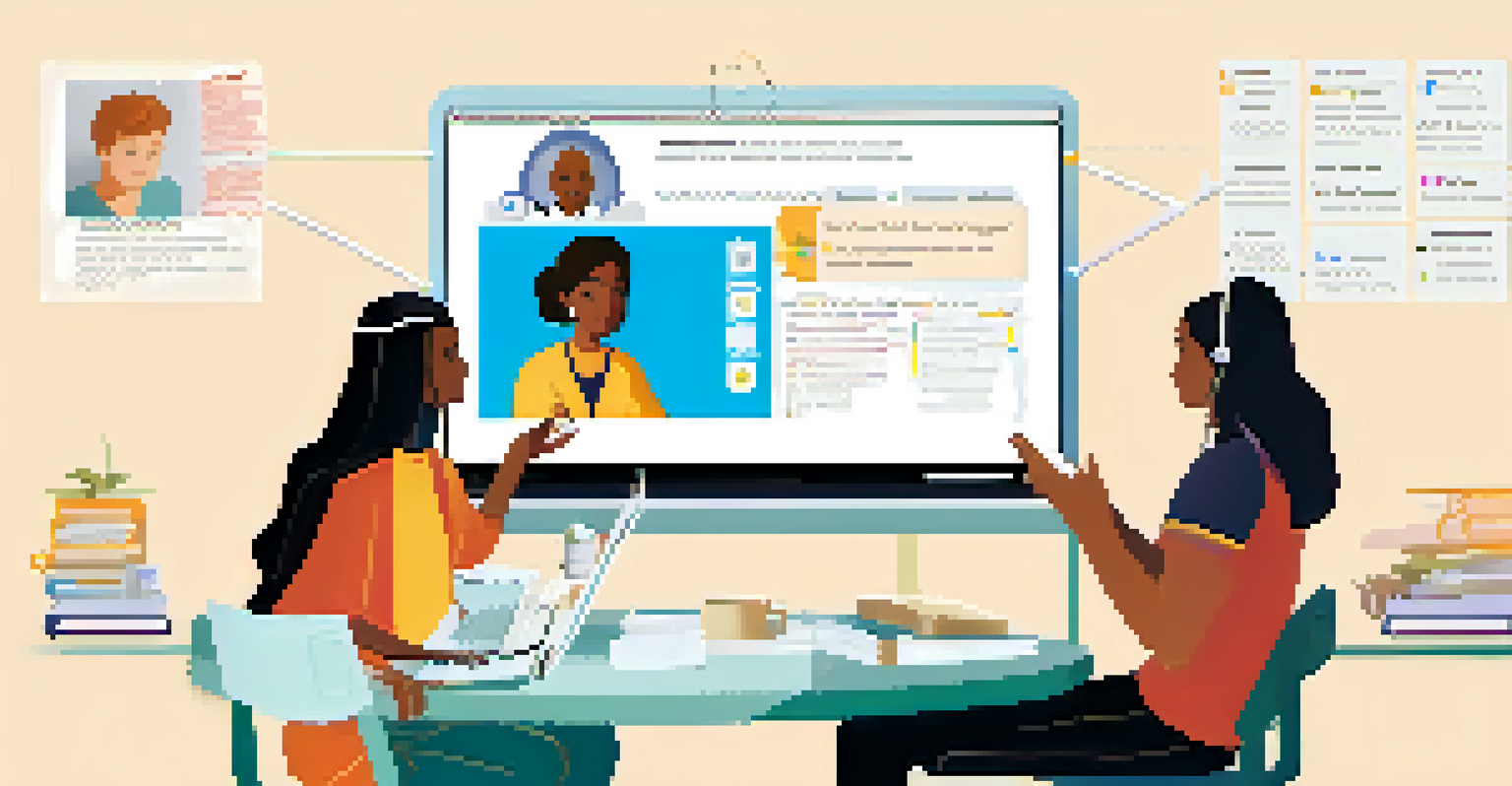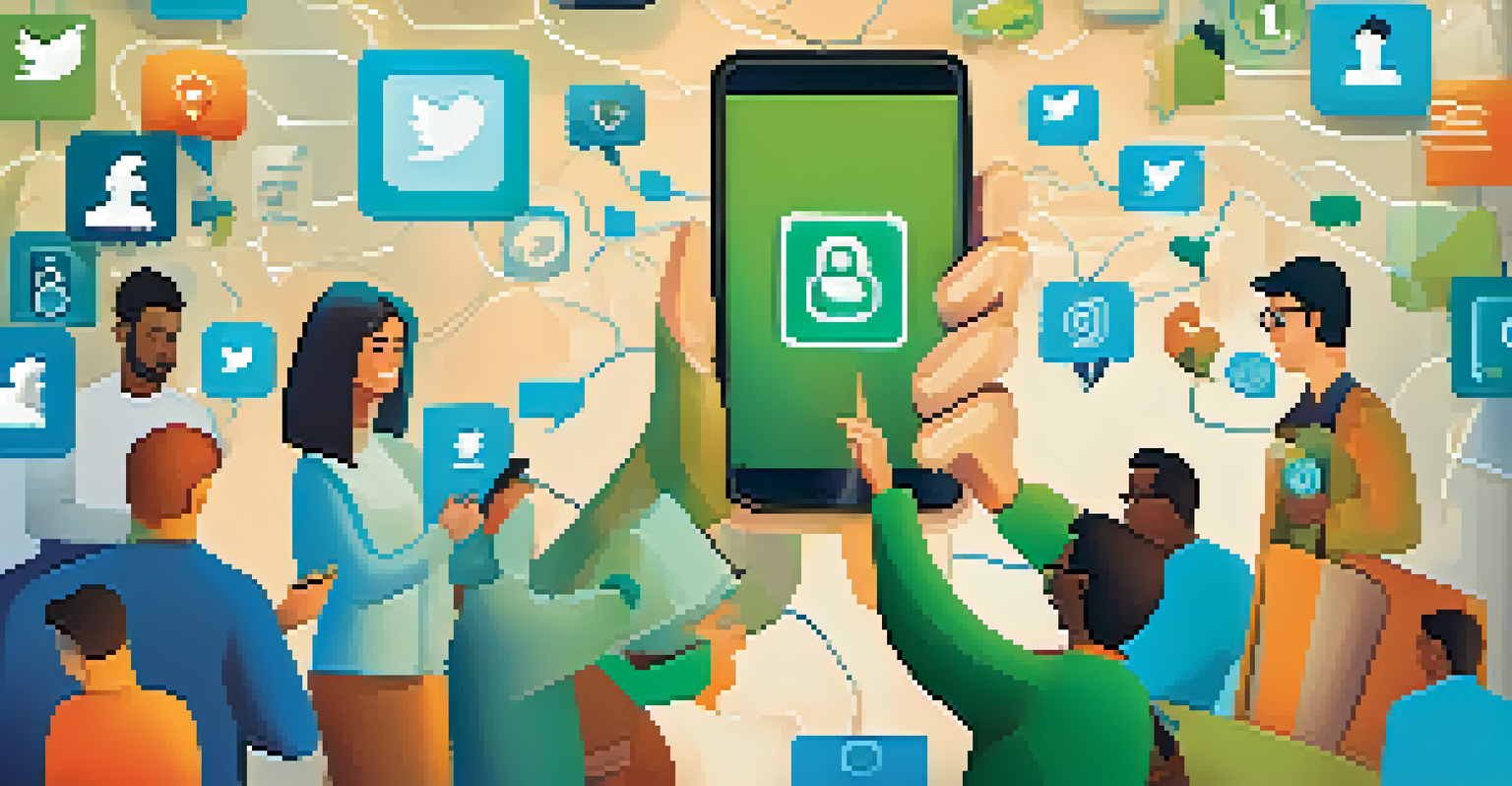Utilizing Technology in Mentoring for Educators and Students

The Importance of Mentoring in Education Today
Mentoring plays a vital role in education, providing guidance and support to both educators and students. It fosters a sense of community and encourages personal and professional growth. In a rapidly changing educational landscape, the need for effective mentoring relationships has never been more crucial.
A mentor is someone who sees more talent and ability within you than you see in yourself, and helps bring it out.
As educators face new challenges, having a mentor can lead to better teaching practices and improved student outcomes. Similarly, students benefit immensely from mentorship, gaining insights and encouragement that can shape their academic journeys. This mutual benefit is where the integration of technology can make a significant difference.
By leveraging technology, mentors can connect with their mentees more effectively, offering real-time support and resources. This modern approach enhances the mentoring experience, making it more accessible and impactful for everyone involved.
Digital Tools for Enhanced Communication in Mentoring
In today's digital age, communication tools are essential for effective mentoring. Platforms like Zoom, Microsoft Teams, and Google Meet allow mentors and mentees to connect virtually, breaking down geographical barriers. This flexibility makes it easier to schedule meetings and maintain regular contact, which is critical for building strong relationships.

Moreover, messaging apps like Slack or WhatsApp enable quick check-ins and ongoing discussions, fostering a continuous dialogue. This instant communication can be particularly beneficial for students who may need immediate advice or support. The ability to reach out at any time helps ensure that no one feels alone in their educational journey.
Mentoring Enhances Educational Success
Effective mentoring relationships provide guidance and support that lead to improved teaching practices and student outcomes.
These digital tools not only enhance communication but also provide a platform for collaboration. Mentors and mentees can share resources, feedback, and ideas seamlessly, enriching the mentoring experience and making it more dynamic.
Utilizing Online Learning Platforms for Resource Sharing
Online learning platforms like Google Classroom, Edmodo, and Moodle are invaluable for mentoring relationships. They provide a centralized space where mentors can share resources, assignments, and feedback with their mentees. This creates an organized and efficient way to facilitate learning and growth.
Mentoring is a brain to pick, an ear to listen, and a push in the right direction.
Additionally, these platforms often feature discussion boards or forums where students can ask questions and engage with their mentors and peers. This collaborative environment encourages deeper learning and fosters a sense of belonging. It also empowers students to take charge of their learning by accessing materials at their convenience.
Using these platforms, mentors can tailor resources to meet the specific needs of their mentees, ensuring that support is personalized. This targeted approach can significantly enhance the effectiveness of mentoring, ultimately leading to better educational outcomes.
Leveraging Social Media for Mentoring Connections
Social media can be a powerful tool for building mentoring relationships. Platforms like LinkedIn, Twitter, and even Instagram allow educators and students to connect beyond traditional settings. By engaging with one another on social media, mentors can share insights, resources, and industry trends that can benefit their mentees.
Moreover, social media can help create a sense of community among mentors and mentees. By participating in relevant groups or hashtags, individuals can find support and share experiences with others who are on similar paths. This broader network can enhance the mentoring experience and provide additional avenues for growth.
Digital Tools Foster Communication
Online platforms and messaging apps enable seamless communication between mentors and mentees, enhancing their connection and collaboration.
However, it’s essential to establish guidelines for appropriate engagement on social media. Ensuring that interactions remain professional and constructive can help maintain the integrity of the mentoring relationship while maximizing the benefits that come from these platforms.
Using Video and Audio Resources for Learning
Video and audio resources can enrich the mentoring experience by providing diverse learning formats. Platforms like YouTube, TED Talks, and podcasts offer a wealth of information that can spark discussions between mentors and mentees. These resources can cater to different learning styles, making the mentoring process more engaging.
Mentors can curate specific content that aligns with their mentees' interests and goals, fostering a deeper connection. For instance, a mentor might recommend a podcast episode that addresses a common challenge in teaching or learning, setting the stage for a meaningful conversation. This not only broadens the mentee's understanding but also reinforces the mentor's role as a guide.
Furthermore, video conferencing tools can facilitate live discussions about these resources, allowing for immediate feedback and interaction. This dynamic approach keeps the mentoring relationship fresh and encourages ongoing exploration of new ideas.
Gamification in Mentoring for Enhanced Engagement
Gamification is an innovative approach that can make mentoring more engaging for both educators and students. By incorporating game-like elements, such as points, badges, or challenges, mentors can motivate their mentees to participate actively in their learning. This fun and interactive method can transform traditional mentoring into a more enjoyable experience.
For example, a mentor might create a challenge where students earn points for completing assignments or participating in discussions. This not only encourages accountability but also fosters a sense of achievement. As students progress and earn rewards, they become more invested in their learning journey.
Gamification Boosts Engagement
Incorporating game-like elements into mentoring can motivate students and make the learning experience more enjoyable and interactive.
Additionally, gamification can open doors for collaborative projects where mentees can work together to achieve common goals. This sense of camaraderie can strengthen relationships and promote teamwork, which are essential skills in both educational and professional settings.
Evaluating and Improving Mentoring Practices with Technology
As technology plays an increasingly important role in mentoring, evaluating its effectiveness becomes crucial. Educators and students can leverage tools like surveys and feedback forms to assess their mentoring relationships regularly. This data-driven approach helps identify areas for improvement and ensures that mentoring practices remain relevant and effective.
For instance, mentors can use digital platforms to gather feedback on their communication styles, resource sharing, and overall support. This insight allows them to adapt their strategies to meet the changing needs of their mentees. Continuous evaluation creates a culture of growth, encouraging both mentors and mentees to strive for excellence.

Ultimately, the goal of mentoring is to foster development, and technology can facilitate this process in meaningful ways. By consistently assessing and refining their practices, educators can enhance the impact of mentoring on student success.